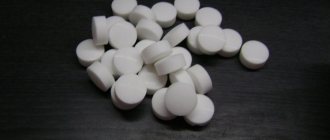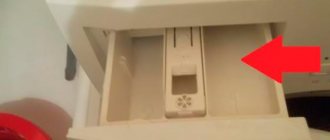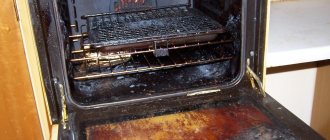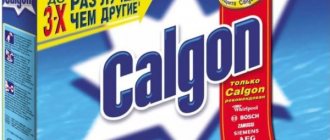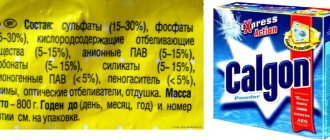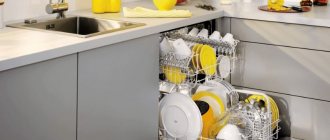Why are salts needed?
The water that flows through the pipes is hard. Regular use of such liquid will cause dishwasher failure. The water may also contain harmful elements (for example, calcium and magnesium).
They pose a particular danger to equipment. Hot water causes plaque (scale) to form. It is because of this that the heating elements of the dishwasher break down. Salt helps get rid of harmful substances.
Important! The use of salts allows you to extend the life of the equipment and prevents damage to the device. Before purchasing this product, you should carefully study the advantages and disadvantages and features of your choice.
What is regenerating salt?
A similar term appeared in connection with the method of water softening used. Calcium gives water hardness; so that it does not damage the device, it must be “transformed” into sodium. Dishwashing machines are equipped with an ion exchanger containing resins that can replace magnesium and calcium ions with harmless sodium. But over time, sodium is washed out from the ion exchanger, and the ability to attract calcium decreases. Salt restores the “supply” of sodium and renews the “working force” of the ion exchanger.
regenerating salt
It is important! You should not use regular table salt in the dishwasher, it is of no use. Regenerating salt for household appliances undergoes special processing and has a more complex composition.
What is the best regenerating salt? It is difficult to give a definite answer to this question; each housewife makes her own choice, but there are several products that have gained popularity among all categories of consumers.
Bosch dishwasher salts
Today, the German concern has become the leader in the dishwasher segment. Is there salt for Bosch dishwashers? Did not hear. A manufacturer of household appliances simply does not have the time to build a chemical plant where components for washing and washing will be produced. Costs money, technology needs development. Having discarded industrial espionage, the purchase of a certificate, a patent, Bosch has little chance of catching up with competitors in this area. Perhaps, buy a ready-made franchise. We recommend choosing dishwasher salt from a reputable manufacturer.
Housewives praise Finish. Expensive salt is 100 rubles per kilogram, but scale will not form. Beware of fakes, otherwise it’s easier to pour regular soda and half-and-half salt inside. Cheaper for the same quality. We have no doubt that chemists, unlike the authors who received straight A's, will be able to synthesize the simple composition given above at home; we will not undertake to help. Knowledge level is low. Our faith in our own abilities was destroyed in childhood (in relation to chemistry), so we leave the question for a more capable contingent.
See you in the next reviews!
Differences from regular salt
The difference between regenerating salt and food salt is:
- deep purification from impurities;
- granule size.
Table salt contains impurities that disrupt the functioning of the ion exchanger and adversely affect the internal metal parts of the dishwasher.
Have you set the water hardness in the PMM? Yes, of course. No.
Thoughtful granulation of a special salt composition ensures that the substance dissolves slowly, without clogging the ion exchanger filters.
In addition, the product for PMM contains additives that are useful for the operation of the device:
- sodium citrate, which destroys germs;
- polyaspaginate, necessary for the reduction and preservation of ions.
Composition of salt for PMM
People who have not immersed themselves in the study of the compositions used for dishwashers, when they hear the word salt, imagine ordinary table salt, which is used in cooking. In fact, these are qualitatively different substances.
The composition intended for the use of PMM is distinguished by large granules that have a uniform white color without inclusion of foreign impurities. Before appearing on store shelves, this salt undergoes multi-stage purification.
Sometimes the product may be available in tablet form
The main active ingredient of the dishwasher composition is sodium salt, which has the formula NaCl. In addition to it, manufacturers can add other components, including:
- sodium citrate, necessary to eliminate germs;
- sodium percarbonate;
- disilicate, which is also used to soften water;
- sodium polyaspartate, which is the basis for retaining ions and serves as a thickener;
- flavors and aromatic fragrances to give water a neutral odor.
For your information! It is common among people to call the composition for PMM “table salt,” which is not at all correct, despite the same main component.
Types of packaging
Tablet and powder forms of regeneration salt for dishwashers protect equipment from scale, improve its performance and soften water. If you can’t buy it, you can replace this product with a regular cooking one. Many companies are involved in the production of salt. The main feature of such compositions is their impressive purity. They do not contain harmful components such as:
- phosphates;
- dyes;
- chlorine;
- flavorings.
This is sodium chloride in its pure form.
Sodium salt, used to soften water, comes in the form of many colorless crystals. It is in this form that most modern products go on sale. They are produced in this way:
- Rock salt, which includes sodium chlorine, is mined.
- Mineral inclusions of non-sodium origin are removed from its structure.
- The finished powder is packaged in special bags and sent to store shelves.
The main point that is paid attention to during production is the degree of purification. There should not be any additional inclusions other than sodium, as they will cause exceptional harm. It is these elements that will act as a source of scale. For the same reason, you cannot use sea or any other salt.
If a detergent component is found in the composition of compressed tablets, you should pay attention to the type of such surfactant. It is better if they contain non-ionic compounds. Unlike anions, the former are less aggressive and are biodegradable.
Functions of salt in the dishwasher
The quality of water in most regions of Russia leaves much to be desired. Apartment owners prefer to install filters on water pipes, but they do not always save the situation.
You can determine water hardness by the appearance of the taps in the bathroom and kitchen. White deposits indicate excessive limestone content. Tap water contains a certain amount of calcium ions. When heated, it precipitates, gradually compressing into a thick coat of scale.
If you use tap water for boiling without filtering, the kettle will quickly become covered with scale from the inside. The same thing happens with heating elements in a dishwasher. The heating tube spends more electricity to heat the water, and at a certain point, under the influence of too high a temperature, the spiral burns out.
Most PMMs are equipped with a built-in ion exchange filter with a resin consisting of sodium chloride. Water passes through it, and magnesium and calcium ions with a positive charge are deposited on the resin particles. The water is saturated with sodium ions with a negative charge and becomes softer.
The resin loses its original properties over time and needs to be regenerated with sodium chloride. The dishwasher's ion exchanger is equipped with a salt container. The salt presence indicator signals that it is time to replenish the amount.
Attention! The degree of salt consumption for one washing cycle is set in manual or automatic mode, depending on the hardness of the water.
The water softener adjustment is located on the dishwasher lid. Most models provide the ability to set 7 levels: 0 – soft water, 7 – hard water. The level is determined depending on the amount of combined detergents and water quality.
To set the correct mode, evaluate the water quality:
- get information from the Internet depending on the region;
- use indicator strips;
- wash your hands with ordinary laundry soap - if the foam is washed off quickly - the water is hard, if it takes a long time - soft;
- visually assess the presence of plaque on plumbing fixtures.
Reference. Sodium cationization is a chemical process of exchanging sodium ions for magnesium and calcium ions, which affect water hardness. As sodium ions are depleted, they are added to the water to restore the ion exchange resin.
Functions of sodium salt for dishwasher:
- softening water for washing;
- restoration of sodium reserves in the ion exchanger;
- decomposition of scale on metal elements;
- improving the quality of washing;
- protection of dishes and the human body from the negative effects of lime deposits.
Replacing dishwasher salt
To form a colloid (in Russian, brine), when filling for the first time, add a little water through the neck into the salt compartment. The lid at the bottom of the working compartment of the dishwasher is unscrewed, and the necessary manipulations are carried out through the funnel. Note! Surely the water will overflow, even brine. It's OK. But! Always make the dressing right before washing the dishes. Protect the bottom of the working compartment from corrosion with a strong saline solution. Don't be afraid, the excess will be collected by the drainage pump and drained into the sewer.
Many people ask:
- How much salt to put in the dishwasher. Usually filled per kilogram in full-size models. Check the instructions. One kilogram is enough for 35 uses for 14 sets of dishes. But! Depends on the hardness of the water entered into the dishwasher program or determined by the sensor. Consumption will vary by region.
- Why does regenerating dishwasher salt have a strange name? The regeneration process is characterized by two aspects - renewal, restoration. When we add dishwasher salt inside, we replenish the supply of sodium ions and colloidal structures. It can be called regeneration.
Dishwasher salt rating
There is a large selection of special compositions for water softening on the domestic market. Let's see what's popular with consumers and what they say about their effectiveness. To decide which salt to choose for PMM, you need to compare the properties and cost of the products offered.
Finish Calgonite
Salt manufacturer Finish promises that its products:
- capable of removing the thickest layer of scale;
- prevents scale formation;
- does not contain impurities;
- prevents the appearance of smudges on dishes;
- easily dissolves in water.
Package weight - 1.5 kg. Price - 590–600 rubles. This product contains sodium chloride. But carefully processed, without impurities and debris. Its granules dissolve slowly and evenly - just as a dishwasher needs.
“Finish” is sold in different packages, but there are no fundamental differences between the offered options. In addition to the one and a half kilogram package, there are packs of 1.2 and 4 kg. Produced in Germany, Poland, Russia. We sell the Russian version - weight 1.5 kg, inscriptions - in Russian. European products are more expensive, and getting them in Russia is problematic. Reviews about “Finish” are rather positive; users note the following features of the drug:
- adds shine to dishes - no plaque or smudges;
- 1.5 kg is enough for 3–4 months of PMM operation.
The disadvantage of Finish is its high cost. Some users note the size of the granules, but this fact is not negative - their size is designed for a certain dissolution rate.
Somat
Somat brand products are manufactured by the German company Henkel. The basis of the composition is sodium chloride. Packaging: 1.5 kg cardboard boxes. Cost - 240 rubles. Advantages:
- affordable cost - “Somat” is cheaper than “Finish”;
- the cardboard packaging is equipped with a spout through which it is convenient to pour granules;
- there are no harmful impurities in the composition;
- effectively softens water;
- A pack lasts for almost a year.
Review of manufacturers
Almost every company that specializes in the production of dishwashers simultaneously produces both detergent and salt compositions. The instructions for the technique include a recommendation on which brands of salt should be used and in what dosage. It is difficult to form an optimal rating of manufacturers while simultaneously analyzing the parameters. It is problematic to invent something new, since the composition is almost always similar. This is pure sodium chloride with a concentration of 99.5%.
According to existing standards, such a product should not contain rinsing agents, additives, or detergent impurities. If there is something like that, we are not talking about salt for the ion exchanger, but about a simple dishwashing detergent such as 3 in 1 or 5 in 1. These powders and tablets should be placed in another compartment.
Large sodium chloride crystals are ideal. Fine grinding results in the substance being consumed too quickly. It is better to avoid such products. The granules must have a minimum size of 4 mm. Tablets are also good, but it is difficult to find the required amount to place in the ion exchanger. The following products can be included in the product rating:
- Finish Calgonit. First place can be given to this product, since it has not received a single negative review from housewives. As for the price, the product can be placed in the middle segment.
- Sodasan. The level of purity from additional inclusions of this product is quite decent. However, compared to the previous brand, it will cost a little more.
- Somat. It is characterized by relative salt frequency and the complete absence of additional impurities. However, the crystals from this manufacturer are smaller.
- "Eonite." I’m ready to present two options for salts. These are CLEANVON and “Regenerating NATURAL” products. The first has a purification rate of almost 100%. The second one is made on the basis of natural material. This salt is created using a single evaporation technology. But as for the naturalness of sodium chloride, this is rather a publicity stunt. The cost of these products is 100 rubles per 1.5 kg. This cost is considered budget.
- Top House. The crystals of this product are the largest of all those produced on the market today. However, the price here is quite high. It would seem that this is a drawback, but considering that the salt lasts for a long time, the cost is completely justified.
The cost of a pack of salt for PMM weighing one and a half kilograms is no more than 250. Price formation is influenced by the individual policy of the seller, the region, and various promotions with discounts on goods. If you can find a cheap product costing less than 100 rubles, you can hardly hope for any quality. Cheapness is achieved due to a small degree of purification of sodium chloride or significant grinding of the granules. At best, such salt will be consumed quickly. At worst, you can expect potential damage to your washing machine.

